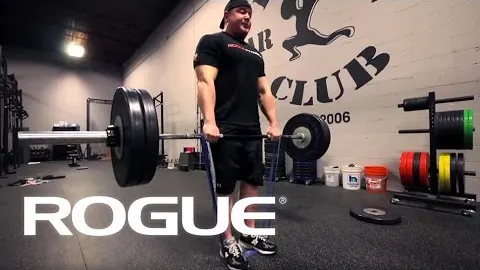
If you're looking to take your strength and muscle development to the next level, the deadlift with bands is an exercise you should consider incorporating into your workout routine. This compound movement targets multiple muscle groups, including the hamstrings, glutes, lower back, and traps. By adding resistance bands to the traditional deadlift, you increase the overall difficulty and engagement of the muscles involved, leading to greater strength gains and improved muscle development.
Increased Resistance: The primary benefit of incorporating resistance bands into the deadlift is that they add extra tension throughout the entire range of motion. As you lift the barbell off the floor, the resistance bands become stretched, creating a higher level of tension at the top of the movement. This allows you to work against increased resistance, challenging your muscles further and promoting greater strength gains.
Enhanced Muscle Activation: The addition of resistance bands to the deadlift stimulates greater muscle activation. The bands create a very different loading pattern compared to traditional weightlifting, providing a unique stimulus to the muscles. This increased activation leads to greater muscle fiber recruitment, resulting in improved muscle development.
Improved Eccentric Strength: The eccentric, or lowering phase, of the deadlift is where a high amount of force is generated. By incorporating resistance bands, you are forced to control the weight as it's lowered, adding an extra challenge and stimulating further strength gains. This eccentric overload can contribute to increased muscle growth and improved overall strength.
Core Stability: The deadlift with band exercise requires a high level of core stability and control. The bands pull the weight in a slightly different direction, challenging your core muscles to stabilize and maintain proper form. This not only strengthens your core muscles but also improves your overall balance and posture.
To perform the deadlift with a band correctly, follow these steps:
Set Up: Begin by placing a resistance band around the middle of the barbell. Step on the band with your feet shoulder-width apart, making sure the band is securely positioned. Stand tall with your chest up, shoulders back, and a slight bend in your knees.
Grip: Grip the barbell just outside of your shins, with your hands slightly wider than shoulder-width apart. A mixed grip, with one palm facing forward and one facing backward, can provide additional grip strength.
Lift: Keeping your back straight and your core engaged, push through your heels to lift the barbell off the floor. As you begin to lift, the tension from the resistance band will increase, providing added resistance.
Drive: Continue to drive through your heels and maintain a strong, tight core as you stand up tall. Keep your back straight throughout the movement, avoiding any rounding or arching.
Lower: Lower the barbell back down to the starting position by hinging at your hips and bending your knees. Control the descent of the barbell under tension from the resistance band.
While the deadlift with band exercise is highly effective, it's essential to prioritize safety. Here are some safety considerations to keep in mind:
Proper Form: Maintaining proper form is crucial to prevent injury. Keep your back straight, engage your core, and avoid rounding or arching your back during the movement. If you're unsure about your form, consider seeking guidance from a certified strength and conditioning professional.
Gradual Progression: Start with lighter resistance bands and gradually increase the tension as your strength improves. This ensures a progressive overload and reduces the risk of injury.
Listen to Your Body: Pay attention to any pain or discomfort during the exercise. If something doesn't feel right, stop immediately and seek advice from a healthcare professional or fitness expert.
The deadlift with band exercise is a powerful addition to your strength training routine. By incorporating resistance bands into the traditional deadlift, you challenge your muscles in unique ways, leading to greater strength gains and increased muscle development. However, it's important to prioritize safety and proper form while performing this exercise. So, strap on those resistance bands and experience the benefits of the deadlift with band for yourself!
If you're looking for a gym, fitness club or yoga studio, you've come to the right place.
You can find information about gyms in your area. Browse catalog of gyms and find gyms with classes which are you looking for.
On gym page you can find simple information like address, phone or website. You can find list of available classes. You can check availability of personal training or small group classes. On place page you can also see information about open hours.
You can find gyms near you with amenities, courts, studios and equipments.
Use our map to find gym at your city or district.
In Gym Navigator you can find list of exercises with movies for many body parts.
You can browse exercises catalog and find exercises the best of you.
You can also find exercises grouped into workout plans, which you can use to improve you body. Each routine show you exercises one by one and give you possibility to count you progress and count down rest time.